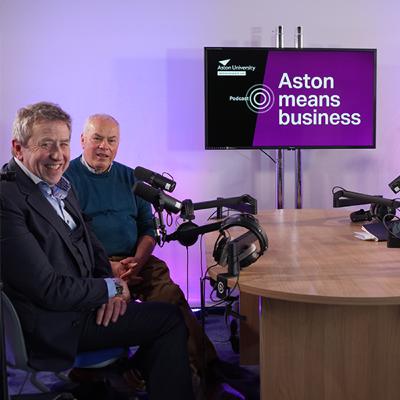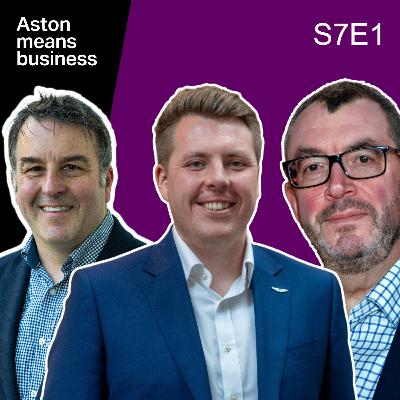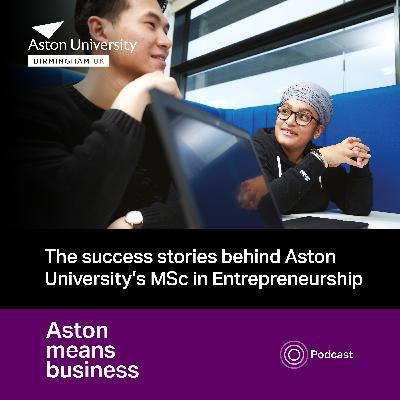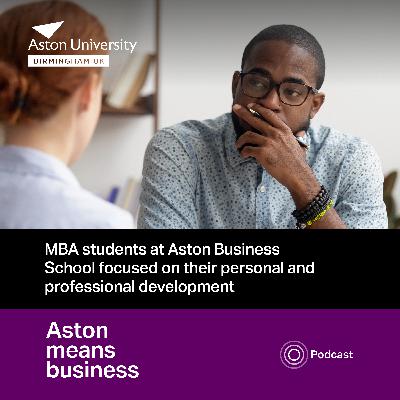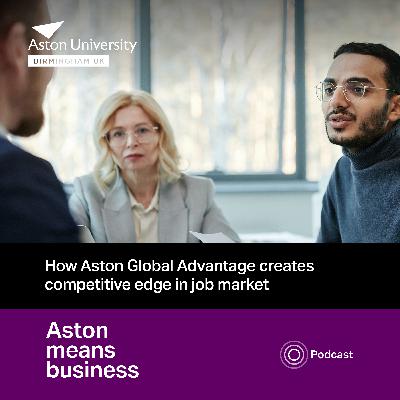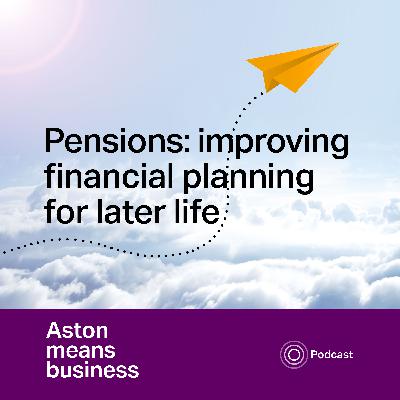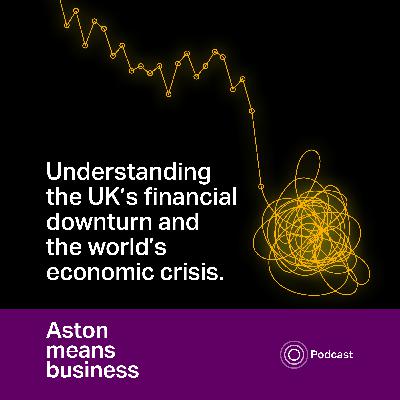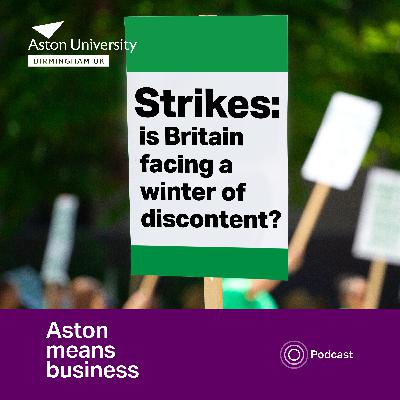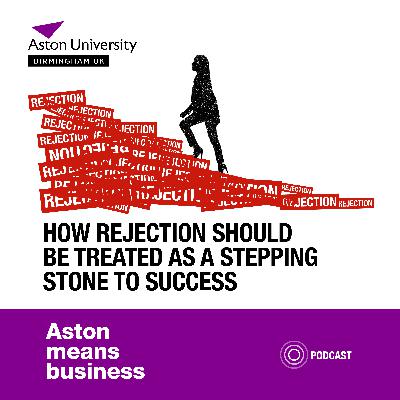Discover Aston means business
Aston means business

61 Episodes
Reverse
Equality, diversity and inclusion (EDI) needs to become “the norm” in organisations to escape “disappointing” government criticism that it is a waste of time.
That’s the guidance coming from the latest episode of ‘Aston means business’, a podcast from Aston University presented by journalist Steve Dyson.
Prof Shivani Sharma, the new deputy dean of people, culture and inclusion at the university’s College of Business and Social Sciences, explained that EDI cultures must become “everybody’s business” to address the existing gender and ethnicity pay gaps.
Responding to recent government criticisms of EDI schemes, Prof Sharma said: “Not enough investment has gone into these roles because, if we look at the history, it tells us that just relying on everybody to do the right thing doesn’t work.”
Also interviewed in the podcast was Omar Rashid, a director of The HR Dept, a human resources franchise for Birmingham Central & Wolverhampton.
Mr Rashid, who specialises in diversity and recruitment, said that government criticism of EDI initiatives was “disappointing”.
But he acknowledged: “I understand where they’re coming from because, if it’s seen as a scheme, as something we’ve got to do, and it’s not done properly, then maybe it is a waste of time and a waste of money. It has to be seen as the norm.”
He said people need to realise they live in a multicultural world, with a diverse workforce, supply chain and customers, and that if implemented properly the benefits of EDI are there.
Mr Rashid, who is also president of the Asian Business Chamber of Commerce in Birmingham, specialises in diversity and recruitment. He added: “There is opportunity there through different skills.
“Each individual, whether it’s race, religion, will bring their own perspectives, their own unique skills, even people with a disability. It shouldn’t be seen as a barrier.”
He said examples of a “tick box mentality” were where businesses might adopt Black History Month but do nothing for the other 11 months of the year, or provide a prayer room during Ramadan but not at any other time.
He added: “When it’s tick box, it’s not worth it because you’ll have a business or someone who will do something for a short period of time. They half-heartedly did something without the conviction. Diversity shouldn’t be just a little bit here and there.”
Prof Sharma went on to say that ‘world days’ such as International Women’s Day can act as a catalyst to focus attention on an issue.
But she added: “It’s really important that why you’re doing that is clear, and that the strategy of raising awareness, to remove barriers to women, equitable inclusion in the workplace or in society, continues throughout the year.”
She said that Aston University had recently gained an Athena Swan Gold award for promoting gender equality in higher education, but that the “scale” of the problem meant there was still lots more to achieve.
She explained that proportions of women entering as students into higher education was really positive, as were degree completion rates. But she pointed to the fact that around 80 per cent of university vice chancellors identified as men, with low representations of ethnic minority women among professors.
Professor Sharma added: “It will take a sustained effort to undo that over time.”
She also praised the Inclusive Aston networking initiative at Aston University, with senior leaders mentoring colleagues of minority ethnic heritage.
Mr Rashid said SMEs needed to look at the opportunities that a diverse workforce and culture can bring to their business.
He added: “One SME business engaged with someone from an Asian background, wanted to tap into India, and guess what? He has the connections and they were able to open a branch in India.”
Human Resource Management MSc
👉 https://tinyurl.com/467trt72
Human Resources and Business Management BSc (Hons)
👉 https://tinyurl.com/yr7cjsxw
The Aston Edge
👉 http://tinyurl.com/3f6243na
A former RAF pilot and combat base commander is helping to provide a new generation of supply chain professionals for some of the world’s biggest companies.
Richard Atkinson said his military background was very “relevant” to his current role as deputy director of the Supply Chain Leadership programme at Aston University.
The former air commodore, who once flew Tornado and Phantom fighter jets and was station commander of RAF Leuchars in Scotland, appears in the latest episode of the Aston means business podcast series, presented by journalist Steve Dyson.
Mr Atkinson, now a teaching fellow at Aston University, said that he was enjoying passing on his knowledge of how to tackle modern day logistics issues to ‘learner colleagues’, along with the experience of many other experts.
He said:
“When I was director of Air Operations in Afghanistan, where we were supporting the development of Afghanistan, the people I spoke to the most were our logisticians, understanding the novel supply chains required.
“And even today, with troubles in the Horn of Africa, the Middle East and with the illegal invasion of Ukraine by Russia, all of these conflicts depend upon supply chains, but they all impact supply chains as well.
“That’s why our programme is so relevant to create the future generation of supply chain leaders.”
Mr Atkinson explained that NATO’s role in Afghanistan meant military forces had to be adaptable every day in terms of supply chains.
He said the big challenge was global warming which would “strategically impact migration and supply chains across the world”.
“In future, we need to hit situations where we can deliver water, food and medicine where they are needed, at the right time, safely, securely and sustainably. So, we need our political leaders, our generals, our admirals, our air marshals, but also supply chain professionals to come up with these solutions, these alternative routes.”
Mr Atkinson said Aston University was the UK’s leading faculty in supply chains with its BSc degree apprenticeship in Supply Chain Management. The programme started four years ago with four companies and now has 30 to 40 companies and hundreds of ‘learner colleagues’.
Companies using the programme include pharmaceutical giant GSK, Coca-Cola, Jaguar Land Rover, DHL, and many other companies.
Mr Atkinson highlighted how GlaxoSmithKline (GSK) had “wonderful scientists and chemists” to create life-changing drugs, such as the new Shingles vaccine, but that they equally needed “amazing logisticians to make sure they get to the right people in the right place at the right time”.
Tim Buchanan, apprenticeship levy lead for GSK, was also interviewed as part of the podcast.
He explained how GSK is based in 133 countries around the world, which means global issues impacted in terms of bringing raw materials in, processing them into the drugs that appear on shelves, and then moving them back out to markets.
Mr Buchanan praised the programme at Aston University and said:
“Getting the new generation of supply chain apprentices up to speed, having them gain the experience … is crucial to the way we go forward.
“We continually know we’ve got to have a group of new people coming in with the skills that Aston University is providing.”
The first few apprentices, who are already full-time employees, will complete the programme this year.
Mr Buchanan said the three main reasons for going on the programme were academics from Aston University going on site to meet GSK line managers, the course having “matured” after listening to feedback and “very high enthusiasm” from the apprentices about the learning.
He added: “We wouldn’t be returning if we didn’t think there was value in the programme.”
Mr Atkinson agreed, pointing out that Aston University was “filling a gap in the market”, which was crucial with the UK having “teetered into a recession” and businesses struggling.
He said: “Let us bring our talent to you to help develop your talent for the future solutions.”
A graduate of Aston University’s Executive MBA has explained how the programme helped his journey from selling Pokemon trading cards at primary school to a rising career with a luxury car-maker.
Jack Miller, a manager at Warwickshire-based Aston Martin, who also combined an apprenticeship degree as part of his MBA, has already enjoyed one promotion while still on the programme, with another rise up the corporate ladder in the pipeline.
He was talking about his experiences in the first episode of the latest ‘Aston means business' podcast series, presented by journalist Steve Dyson.
The new series – the seventh since 2019 – focuses on how the university helps to prepare executives and businesses for Industry 4.0 with Aston University’s 2030 strategy front of mind.
Mr Miller said: “I’ve always been very entrepreneurial, starting from the primary school playground where I was selling everything from Pokémon cards to Belgian waffles and Oreos. Cars is passion number two, something I was obsessed with. Car was my second word, after burger, so it was either Burger King or go into the car industry!
“I remember when my mum got her first car it was the greatest thing that had ever happened. And I remember driving past the local Aston Martin garage and basically dribbling on the car window, thinking: ‘Wow, what are those? I wish I had one of those!’”
Mr Miller, who already had a Batchelor’s degree in business management and entrepreneurship, said it had been his “dream” to do an MBA, specifically one that incorporated an apprenticeship element to make it more practical. He said the Executive MBA at Aston University had resulted in a “rounded knowledge improvement professionally” as well as benefits to his personal competence.
“Personally, it’s amazing, and professionally, you get an incredible qualification out of this. And, frankly, career development. That was one of the big reasons why I did this. Already, during the programme, I managed to get a promotion and I think the next one is hopefully in the offing.”
Mr Miller told how the ability to specialise and “dive into a topic” during the MBA was particularly important and gave him “immense enjoyment”. He said that doing the dissertation, the practical business problem-solving element of the programme, was “extremely powerful”.
“Through the MBA, I realised that strategic thinking and business strategy were areas I was extremely passionate about and had a real keen interest in. My project gave me the ability to conduct interviews with all the senior leadership of the business, to understand the level of understanding with the strategic direction, and to highlight a range of recommendations.”
Mr Miller said Aston Martin also benefitted during the MBA programme, through him designing a process to solve a particular business problem and then applying it to the workplace “that exact day”.
Ian Cornelius, a teaching fellow and director of the executive MBA at Aston, was also interviewed on the podcast. He said the programme provided a “wonderful marriage of academic theoretical discipline …with real practical relevance in the real world of interest to, and value to, organisations.
"Perhaps the unique feature, which we are very proud of, is the Aston Edge, which is our personal development and leadership programme module.”
Mr Cornelius said the MBA was funded via the apprenticeship levy, held by the government, which “added an extra dimension to what we can do at Aston”.
For anyone considering taking up an MBA, Mr Miller’s advice was forthright. “Pure and simple, do it,” he said. “The sooner you do it the better.”
Aston MBA 👉 http://tinyurl.com/4xe84r2s
The Aston Edge 👉 http://tinyurl.com/3f6243na
Aston Business School 👉 http://tinyurl.com/52ua7xxp
Jack Miller 👉 http://tinyurl.com/rm7j59t9
Ian Cornelius 👉 http://tinyurl.com/3nszf5uv
Listen to Aston means business 👉 http://tinyurl.com/56w3h43v
#TeamAston
Francis Mulleady, a Senior Teaching Fellow in Digital Marketing at Aston University, explains how companies need to embrace social media like LinkedIn and TikTok to drive their businesses forward. The programme director of the university’s MSc Strategic Digital Marketing also explains how his course will produce future leaders in digital marketing.
Frances Glover is co-owner of A Natural Undertaking, a Birmingham firm of funeral directors that recently benefitted from Aston University's 12-week Green Advantage course. Frances explains how electric hearses, cardboard coffins and a new process of 'cremation by water' are all part of a growing move towards environmentally friendly funerals. She says the Aston University course is ‘invaluable’ to help companies take the next green step.
Jocelyne Fleming, the course director of Aston Business School's MSc in Entrepreneurship, recalls how one student created recyclable bamboo toothbrushes for hotels in a business created as part of his degree. She also explains how Aston University recently won Entrepreneurial University of the Year for its commitment to entrepreneurial activity, and advised that would-be students needed passion and an eye for business gaps.
Yasmin Ansari, Aston Business School's MBA careers consultant, explains how students benefit from a module called Aston Edge, focusing on career skills and behaviour science. She said MBA students are fully engaged, with “super ambitious and super driven” career aspirations, and that their courses focus on real-life applications and case-based learning.
Dr Jude Preston, a lecturer in the Work and Organisation Department at Aston Business School, explains how the Aston Global Advantage module gives its Masters students a unique head start in landing their dream jobs.
Dr Simon McCabe, a senior lecturer in behavioural science at Aston Business School, discusses how the Healthy Work Research Unit is developing insights and recommendations to industry and the public sector on how to create healthier workplaces.
An automotive firm has experienced a boost in productivity without having to increase staff or buy new machines, thanks to a Knowledge Transfer Partnership (KTP) with Aston Business School. Iain Collis, managing director at Metal Assemblies, and Professor Ben Clegg, of Aston Business School, explain how the project has succeeded.
Tomorrow’s boardroom superstars are emerging from executive leadership apprenticeships at Aston Business School. Discover more about the Masters-level programme from Terry Hodgetts, director of Corporate Client Solutions, and Dr Lloyd Parsons, director of the MBA and Chartered Management Institute programmes.
Sports marketing expert Michael Inpong, a new teaching fellow at Aston Business School, argues that while many huge sports events like the World Cup are sponsored, this form of marketing is ‘very weak’. He says future marketeers need to unleash the power of sport for their businesses – using storytelling to impact on society.
Dr Hayley James, a senior research fellow in the Centre for Personal Financial Wellbeing at Aston Business School and an expert in pensions, discusses her ‘mission’ to improve financial planning for later life.
Dr Dean Garratt, a senior teaching fellow and expert in economics at Aston University, says a recession is “pretty imminent” for the UK resulting in a “painful” year ahead. But he is optimistic that both inflation and interest rates will fall in the second half of next year.
Prof Kathy Daniels, an expert in employment law and employee relations at Aston University, discusses the recent increase in strike action and considers whether Britain is facing a 1970s-style 'winter of discontent'
Successful business leaders need to rely on the power of trust, rather than just trusting in power. Dr John Blakey, who researched the subject for his doctorate at Aston Business School, explains the nine behavioural habits needed to become a trusted executive in the latest episode of 'Aston means business'.
Simple energy savings by SMEs could close half the UK's power stations, according to Dr Mark Smith, business engagement manager on the Low Carbon SMEs project at Aston University. The latest episode of the 'Aston means business' podcast also interviewed Cassie Kirk-Gould, the owner of Sweetmeats Inc, about how her expanding fudge-making firm is completely plastic-free.
Taking staff wellbeing seriously can help drive business success. That's the message in the latest 'Aston means business' podcast from Marc Hornby, who co-founded hospitality group Caviar & Chips after taking an MBA at Aston Business School. The business, which survived Covid-19 and has since grown to employ 100 staff, has just won a national wellbeing award.
Rejection should be treated as a stepping stone to success, according to Dr Rushana Khusainova, a lecturer in marketing and sales at Aston Business School. She explains how entrepreneurs and business people should develop positive ‘self-talk’ as a vital mindset for dealing with rejection.
Mafia film and TV dramas can reveal the value of a trusted ‘second in command’ in business and organisations. That's one of the themes in a podcast from Dr Lloyd Parsons, interim director of MBA programmes at Aston Business School, who explains the power of 'shared and distributed leadership’ and underlines the importance of 'trust and delegation'.



